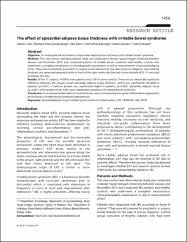The effect of epicardial adipose tissue thickness with irritable bowel syndrome

View/
Access
info:eu-repo/semantics/openAccessDate
2018Author
Çiçek, YükselDurakoğlugil, Murtaza Emre
Duman, Hakan
Erdoğan, Turan
Rakıcı, Halil
Balcıoğlu, Akif Serhat
Metadata
Show full item recordCitation
Cicek, Y., Durakoglugil, M. E., Rakici, H., Balcioglu, A. S., Duman, H., & Erdogan, T. (2018). The effect of epicardial adipose tissue thickness with irritable bowel syndrome. JPMA. The Journal of the Pakistan Medical Association, 68(10), 1456–1460.Abstract
Objective: To investigate the association of epicardial adipose tissue thickness with irritable bowel syndrome. Methods: This case-control and observational study was conducted in Recep Tayyip Erdogan University between January and December 2014, and comprised patients of irritable bowel syndrome and healthy controls who underwent a complete transthoracic echocardiographic examination as well as measurements of epicardial adipose tissue. They were screened for psychiatric or organic bowel diseases for the sake of precise diagnosis. Epicardial fat thickness was measured perpendicularly in front of the right ventricular free wall at end-diastole.SPSS 15 was used to analyse the data. Results: of the 75 subjects, 44(59%) were patients and 31(41%) were controls. There was no statistically significant difference between the groups except epicardial adipose tissue thickness, which was significantly elevated in patients (p<0.001). C-reactive protein was significantly higher in patients (p=0.002). Epicardial adipose tissue (p<0.001) and haematocrit (p<0.05) were independent predictors of irritable bowel syndrome. Conclusion: Increased epicardial adipose tissue thickness, and accompanying low-grade inflammation appeared to be involved in irritable bowel syndrome pathogenesis.

















